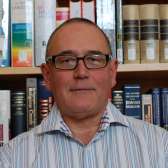
"Ukrainians and the Holocaust in History and Memory"
Professional Background
John-Paul Himka is a professor in the Department of History and Classics at the University of Alberta, Canada. He received a Ph.D. in history and a B.A. with high honors in Byzantine-Slavonic studies at the University of Michigan. For his Pinchas and Mark Wisen Fellowship, Professor Himka conducted research for his project, “Ukrainians and the Holocaust in History and Memory.”
Professor Himka has written extensively on Jews and the Holocaust in Ukraine. His works include Last Judgment Iconography in the Carpathians (2009); Religion and Nationality in Western Ukraine: The Greek Catholic Church and the Ruthenian National Movement in Galicia, 1867-1900 (1999); and Galician Villagers and the Ukrainian National Movement in the Nineteenth Century (1988). He has also authored several journal articles and book chapters, including “Dimensions of a Triangle: Polish-Ukrainian-Jewish Relations in Austrian Galicia” in POLIN: Studies in Polish Jewry (1999) and “Ukrainian Collaboration in the Extermination of the Jews during the Second World War: Sorting Out the Long-Term and Conjunctural Factors” in Jonathan Frankel’s The Fate of the European Jews, 1939-1945: Continuity or Contingency (1997). Professor Himka is the recipient of several fellowships and awards, including the Rutherford Award for Excellence in Undergraduate Teaching in 2006, the Philip Lawson Award for Excellence in Teaching, a Killam Annual Professorship, a McCalla Research Professorship, and several research grants awarded by the Social Sciences and Humanities Research Council of Canada. He also serves on several editorial boards, including the Canadian Slavonic Papers, Journal of Ukrainian Studies, and Ukraina Moderna. He is fluent in Ukrainian and Polish.
Fellowship Research
During his tenure at the Center, Professor Himka researched the collective memory of the Holocaust as seen through the radically divergent Ukrainian and Jewish perspectives. Divisions exist within the Ukrainian collective memory about the Holocaust due to the diaspora and Soviet occupation of Ukraine. Professor Himka’s research focused on two areas of Ukrainian collective memory: (1) the Holocaust from 1941 to 1945, including the pogroms, the role of the Ukrainian police and intelligentsia, and the complex relationship between Jewish discourse of Ukrainian antisemitism and Ukrainian discourse of Judeocommunism, and (2) the recollection and representation of the Holocaust after 1945, including the immediate aftermath from 1945 to 1949, expatriate Ukrainians and Jews from 1978 to 1985, and post-Soviet Ukraine, particularly after the Orange Revolution in 2004, including memories from the diaspora. Professor Himka used the Museum’s many archival collections to complete his research, including selected works from the L’viv Oblast Archives, the Federal Security Service (former KGB) of the Russian Federation Relating to War Crimes Investigations and Trials in the Soviet Union, and the Central State Archive of Public Organizations of Ukraine, L’viv.
Professor Himka was in residence at the Mandel Center from October 1 to December 30, 2009.
